Critical Evaluation: Leadership Theories and Organizational Impact
VerifiedAdded on 2023/04/20
|13
|973
|394
Presentation
AI Summary
This presentation provides a critical evaluation of two prominent leadership theories: behavior and trait theories, and their influence on organizational activities and functions. It begins by defining leadership and its impact on management, then delves into the behavior theory, exploring how leaders' actions and reactions affect their followers and the organization. The advantages and disadvantages of this theory are discussed. Following this, the presentation examines the trait theory of leadership, which focuses on identifying personality traits and characteristics associated with successful leadership. The advantages and disadvantages of this theory are also presented, followed by a comparison of the two theories. The presentation concludes by summarizing how both theories affect leader behavior within an organization. The presentation includes references to relevant academic literature.
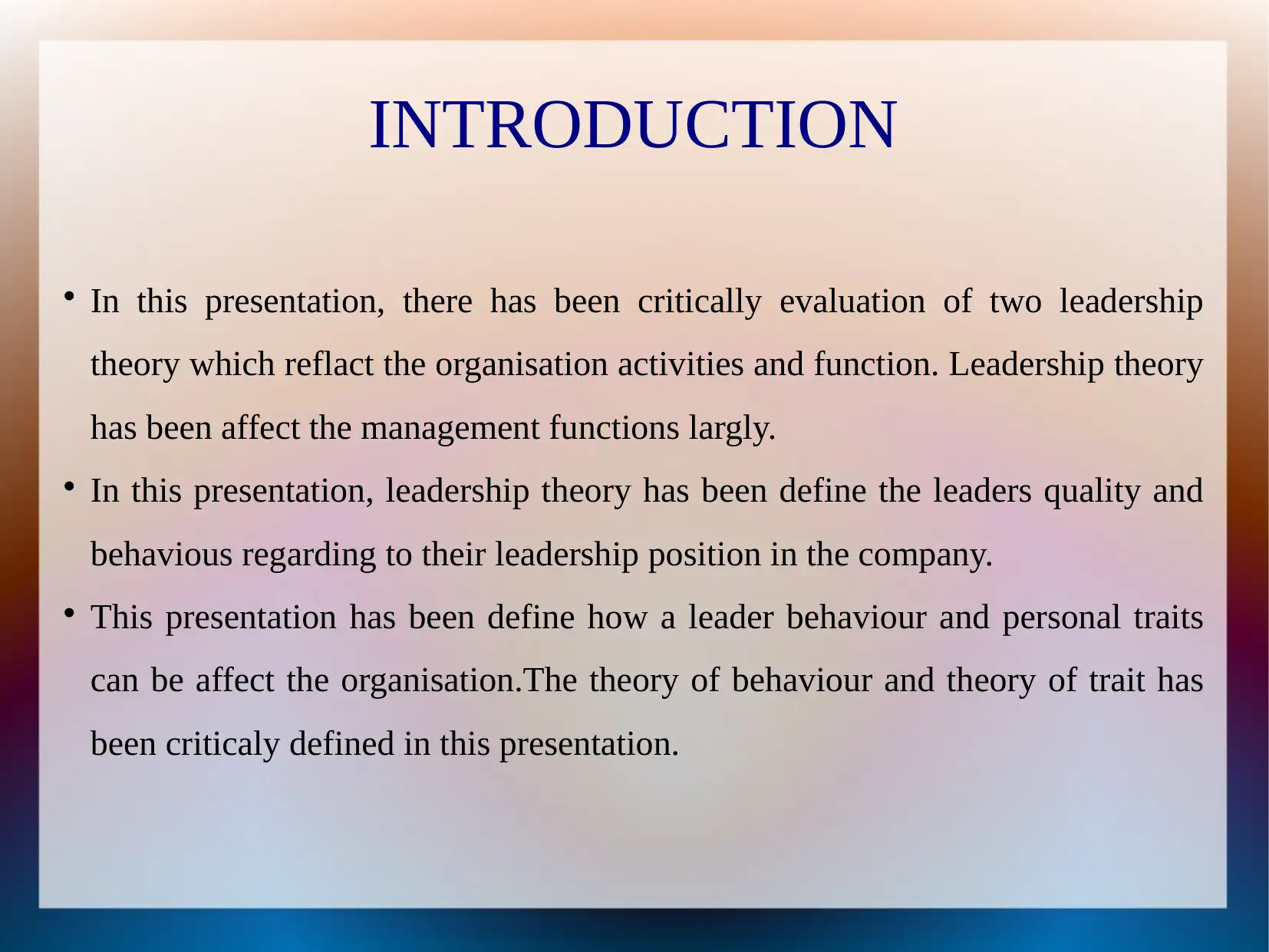
INTRODUCTION
In this presentation, there has been critically evaluation of two leadership
theory which reflact the organisation activities and function. Leadership theory
has been affect the management functions largly.
In this presentation, leadership theory has been define the leaders quality and
behavious regarding to their leadership position in the company.
This presentation has been define how a leader behaviour and personal traits
can be affect the organisation.The theory of behaviour and theory of trait has
been criticaly defined in this presentation.
In this presentation, there has been critically evaluation of two leadership
theory which reflact the organisation activities and function. Leadership theory
has been affect the management functions largly.
In this presentation, leadership theory has been define the leaders quality and
behavious regarding to their leadership position in the company.
This presentation has been define how a leader behaviour and personal traits
can be affect the organisation.The theory of behaviour and theory of trait has
been criticaly defined in this presentation.
Paraphrase This Document
Need a fresh take? Get an instant paraphrase of this document with our AI Paraphraser
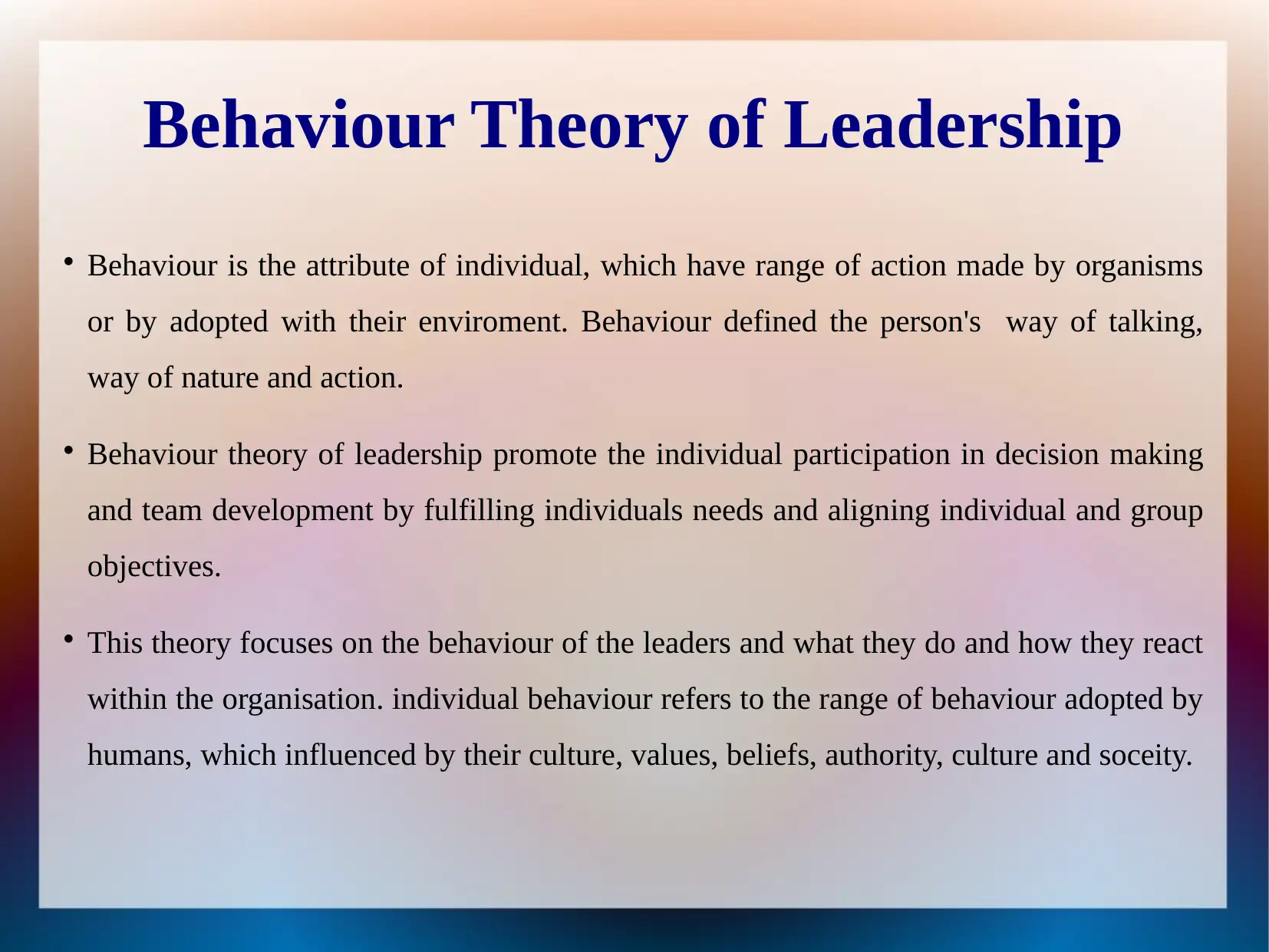
Behaviour Theory of Leadership
Behaviour is the attribute of individual, which have range of action made by organisms
or by adopted with their enviroment. Behaviour defined the person's way of talking,
way of nature and action.
Behaviour theory of leadership promote the individual participation in decision making
and team development by fulfilling individuals needs and aligning individual and group
objectives.
This theory focuses on the behaviour of the leaders and what they do and how they react
within the organisation. individual behaviour refers to the range of behaviour adopted by
humans, which influenced by their culture, values, beliefs, authority, culture and soceity.
Behaviour is the attribute of individual, which have range of action made by organisms
or by adopted with their enviroment. Behaviour defined the person's way of talking,
way of nature and action.
Behaviour theory of leadership promote the individual participation in decision making
and team development by fulfilling individuals needs and aligning individual and group
objectives.
This theory focuses on the behaviour of the leaders and what they do and how they react
within the organisation. individual behaviour refers to the range of behaviour adopted by
humans, which influenced by their culture, values, beliefs, authority, culture and soceity.
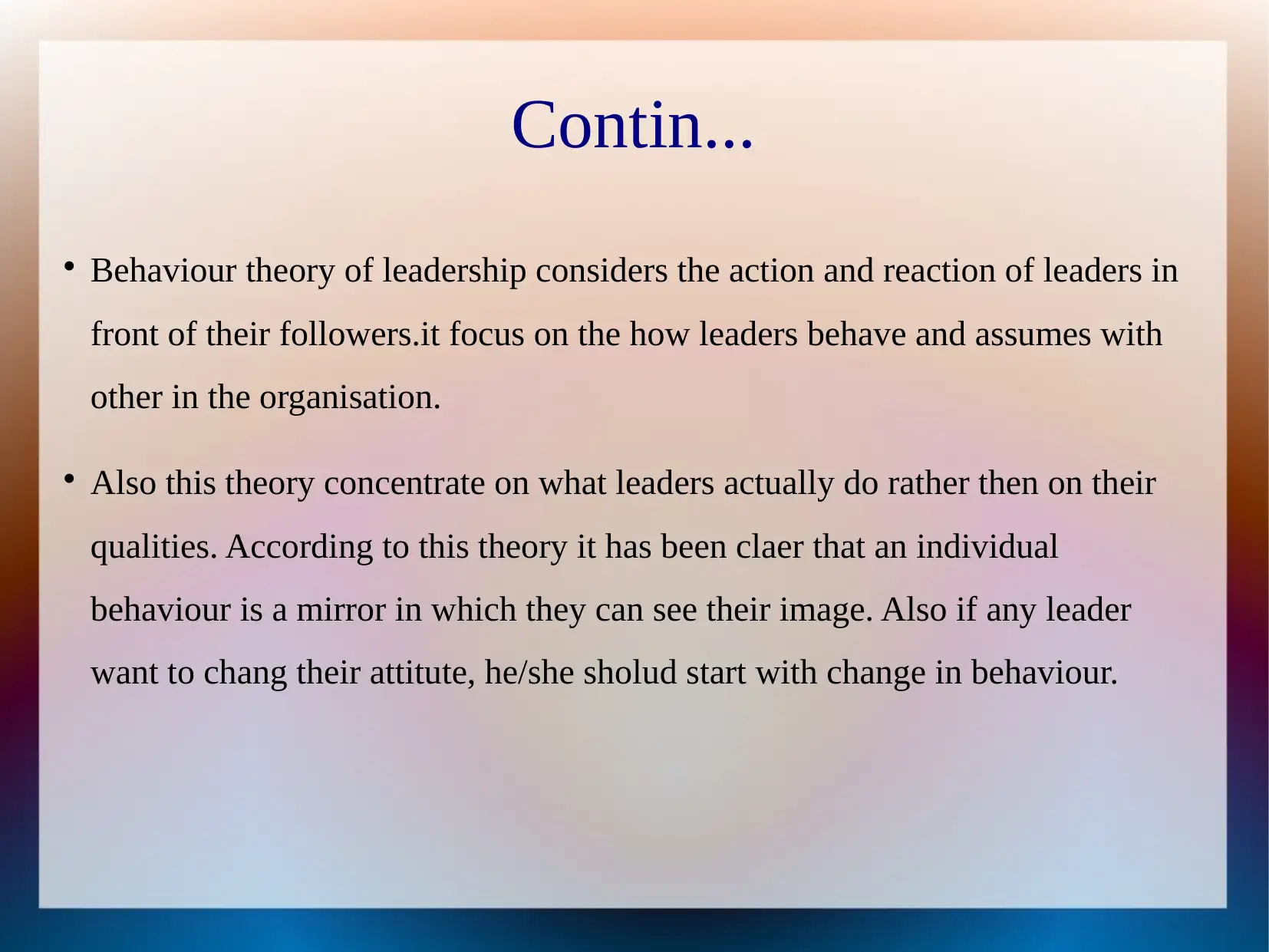
Contin...
Behaviour theory of leadership considers the action and reaction of leaders in
front of their followers.it focus on the how leaders behave and assumes with
other in the organisation.
Also this theory concentrate on what leaders actually do rather then on their
qualities. According to this theory it has been claer that an individual
behaviour is a mirror in which they can see their image. Also if any leader
want to chang their attitute, he/she sholud start with change in behaviour.
Behaviour theory of leadership considers the action and reaction of leaders in
front of their followers.it focus on the how leaders behave and assumes with
other in the organisation.
Also this theory concentrate on what leaders actually do rather then on their
qualities. According to this theory it has been claer that an individual
behaviour is a mirror in which they can see their image. Also if any leader
want to chang their attitute, he/she sholud start with change in behaviour.
⊘ This is a preview!⊘
Do you want full access?
Subscribe today to unlock all pages.

Trusted by 1+ million students worldwide
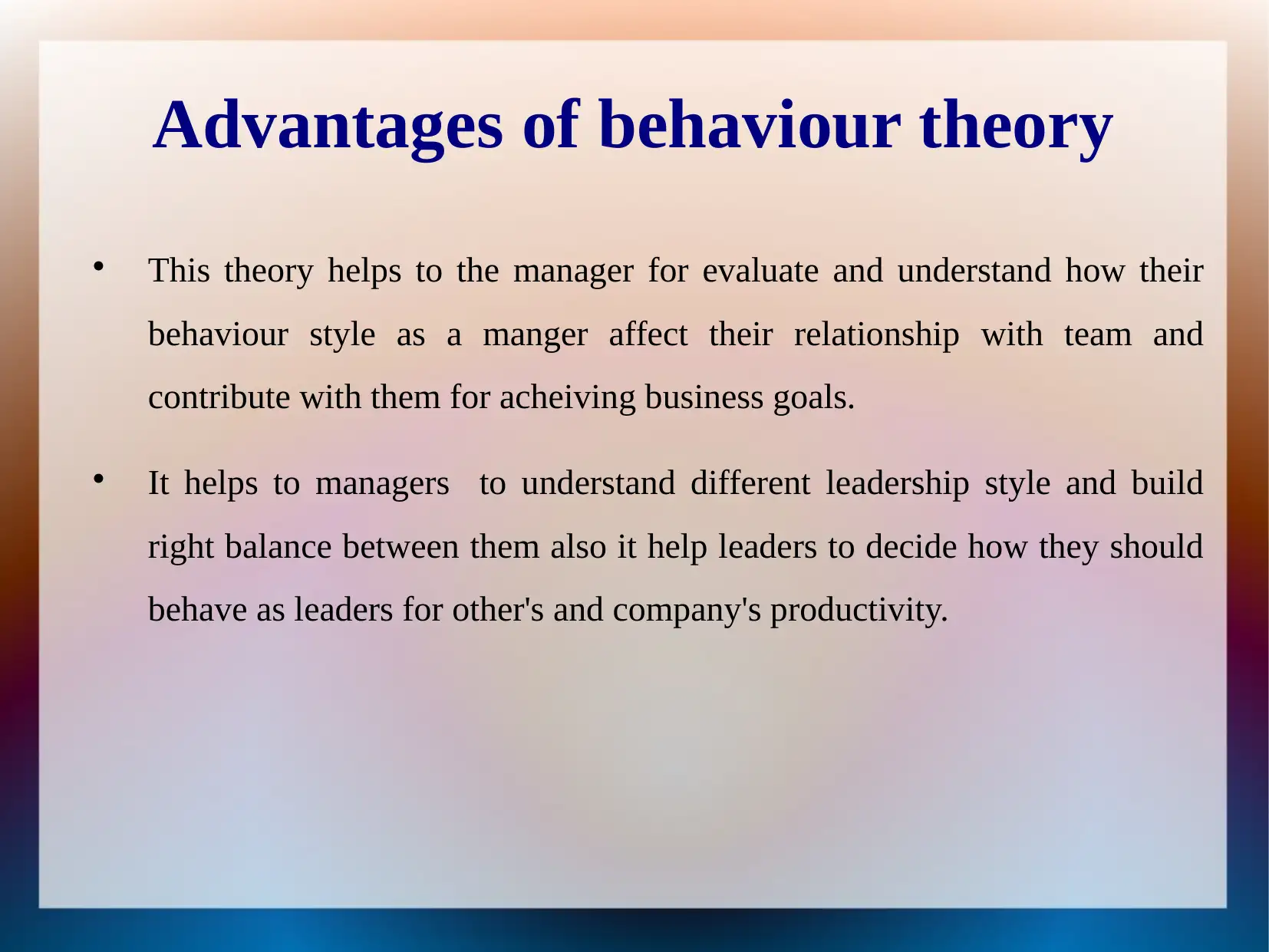
Advantages of behaviour theory
This theory helps to the manager for evaluate and understand how their
behaviour style as a manger affect their relationship with team and
contribute with them for acheiving business goals.
It helps to managers to understand different leadership style and build
right balance between them also it help leaders to decide how they should
behave as leaders for other's and company's productivity.
This theory helps to the manager for evaluate and understand how their
behaviour style as a manger affect their relationship with team and
contribute with them for acheiving business goals.
It helps to managers to understand different leadership style and build
right balance between them also it help leaders to decide how they should
behave as leaders for other's and company's productivity.
Paraphrase This Document
Need a fresh take? Get an instant paraphrase of this document with our AI Paraphraser
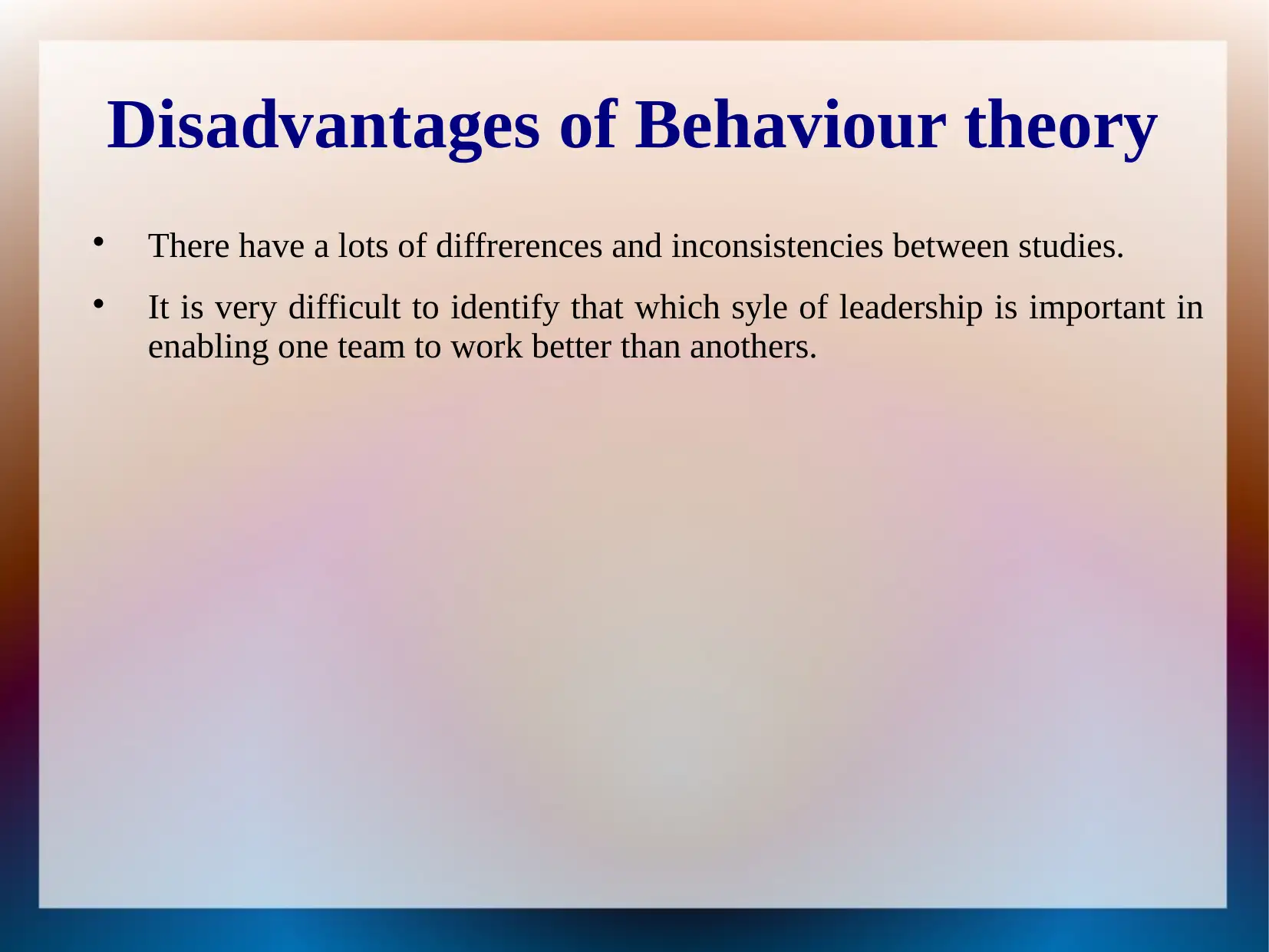
Disadvantages of Behaviour theory
There have a lots of diffrerences and inconsistencies between studies.
It is very difficult to identify that which syle of leadership is important in
enabling one team to work better than anothers.
There have a lots of diffrerences and inconsistencies between studies.
It is very difficult to identify that which syle of leadership is important in
enabling one team to work better than anothers.
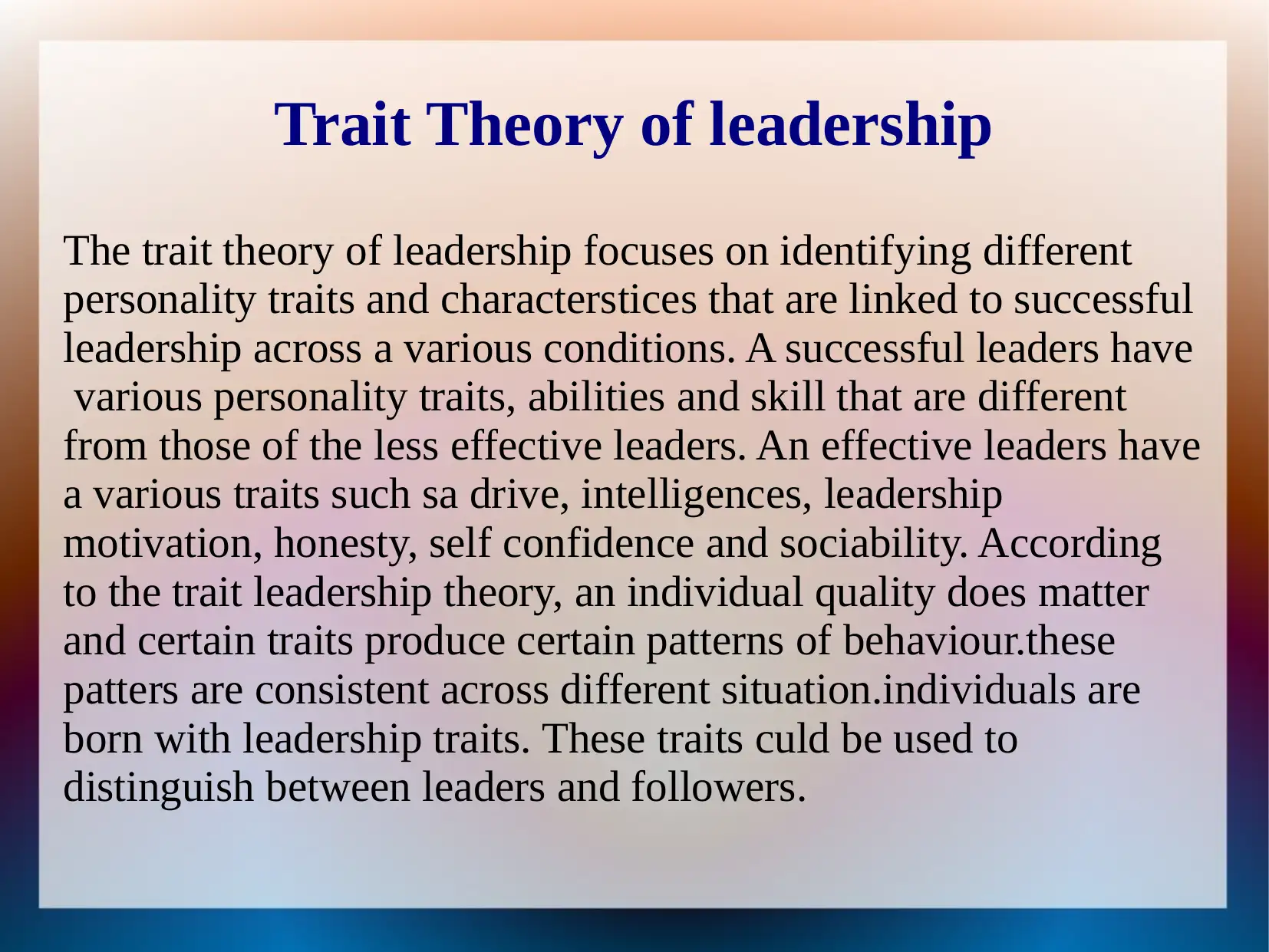
Trait Theory of leadership
The trait theory of leadership focuses on identifying different
personality traits and characterstices that are linked to successful
leadership across a various conditions. A successful leaders have
various personality traits, abilities and skill that are different
from those of the less effective leaders. An effective leaders have
a various traits such sa drive, intelligences, leadership
motivation, honesty, self confidence and sociability. According
to the trait leadership theory, an individual quality does matter
and certain traits produce certain patterns of behaviour.these
patters are consistent across different situation.individuals are
born with leadership traits. These traits culd be used to
distinguish between leaders and followers.
The trait theory of leadership focuses on identifying different
personality traits and characterstices that are linked to successful
leadership across a various conditions. A successful leaders have
various personality traits, abilities and skill that are different
from those of the less effective leaders. An effective leaders have
a various traits such sa drive, intelligences, leadership
motivation, honesty, self confidence and sociability. According
to the trait leadership theory, an individual quality does matter
and certain traits produce certain patterns of behaviour.these
patters are consistent across different situation.individuals are
born with leadership traits. These traits culd be used to
distinguish between leaders and followers.
⊘ This is a preview!⊘
Do you want full access?
Subscribe today to unlock all pages.

Trusted by 1+ million students worldwide
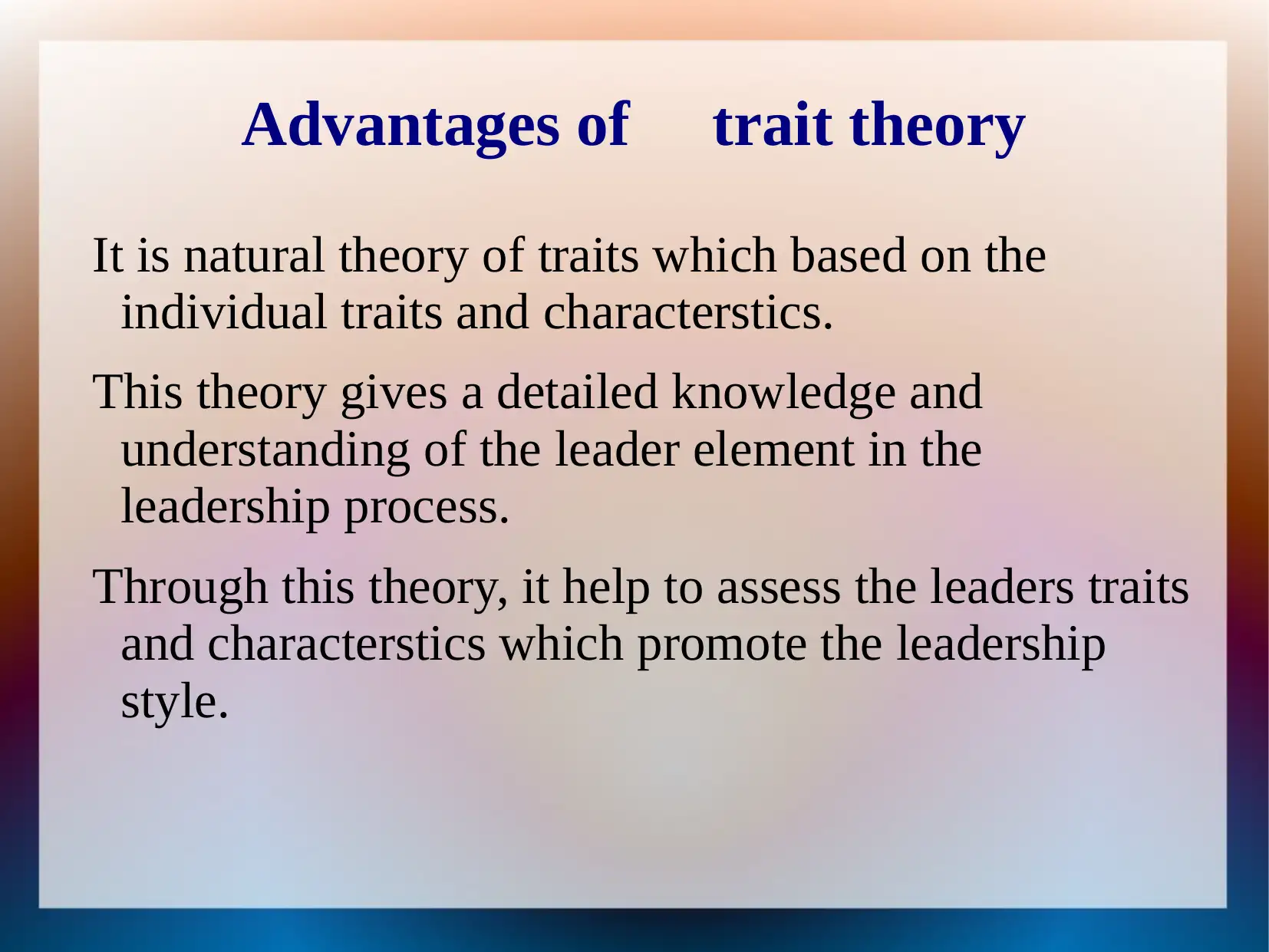
Advantages of trait theory
It is natural theory of traits which based on the
individual traits and characterstics.
This theory gives a detailed knowledge and
understanding of the leader element in the
leadership process.
Through this theory, it help to assess the leaders traits
and characterstics which promote the leadership
style.
It is natural theory of traits which based on the
individual traits and characterstics.
This theory gives a detailed knowledge and
understanding of the leader element in the
leadership process.
Through this theory, it help to assess the leaders traits
and characterstics which promote the leadership
style.
Paraphrase This Document
Need a fresh take? Get an instant paraphrase of this document with our AI Paraphraser
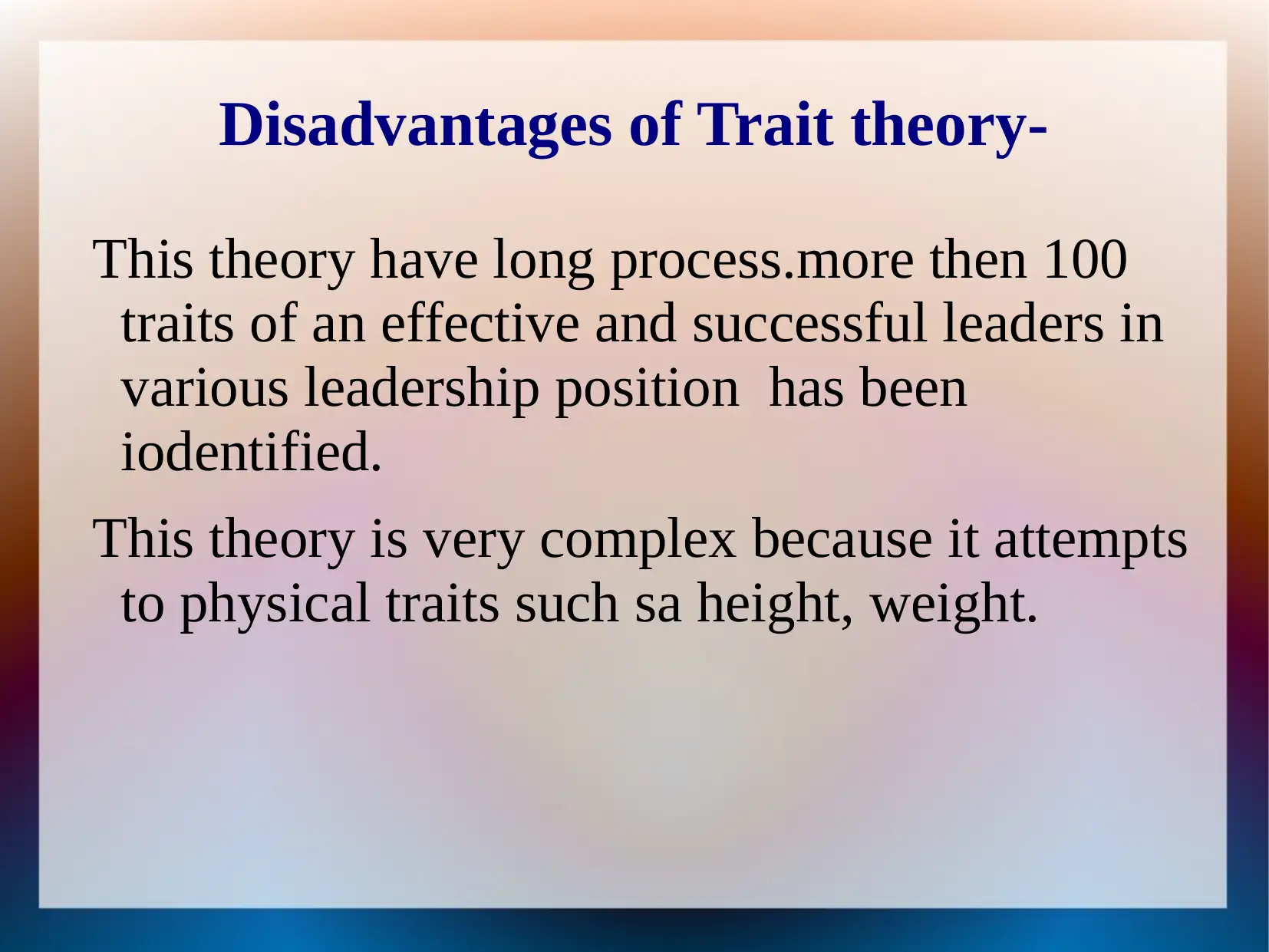
Disadvantages of Trait theory-
This theory have long process.more then 100
traits of an effective and successful leaders in
various leadership position has been
iodentified.
This theory is very complex because it attempts
to physical traits such sa height, weight.
This theory have long process.more then 100
traits of an effective and successful leaders in
various leadership position has been
iodentified.
This theory is very complex because it attempts
to physical traits such sa height, weight.
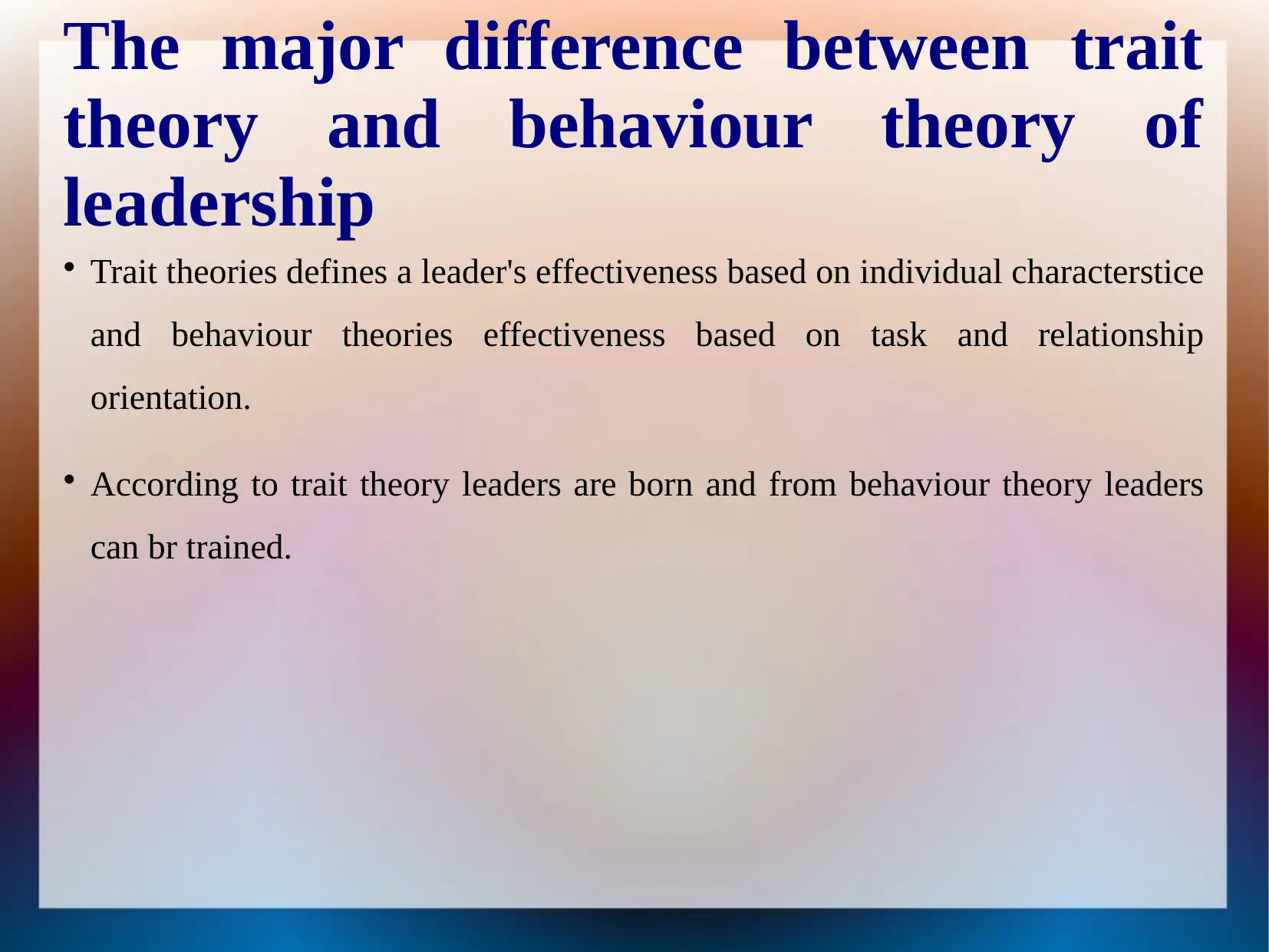
The major difference between trait
theory and behaviour theory of
leadership
Trait theories defines a leader's effectiveness based on individual characterstice
and behaviour theories effectiveness based on task and relationship
orientation.
According to trait theory leaders are born and from behaviour theory leaders
can br trained.
theory and behaviour theory of
leadership
Trait theories defines a leader's effectiveness based on individual characterstice
and behaviour theories effectiveness based on task and relationship
orientation.
According to trait theory leaders are born and from behaviour theory leaders
can br trained.
⊘ This is a preview!⊘
Do you want full access?
Subscribe today to unlock all pages.

Trusted by 1+ million students worldwide
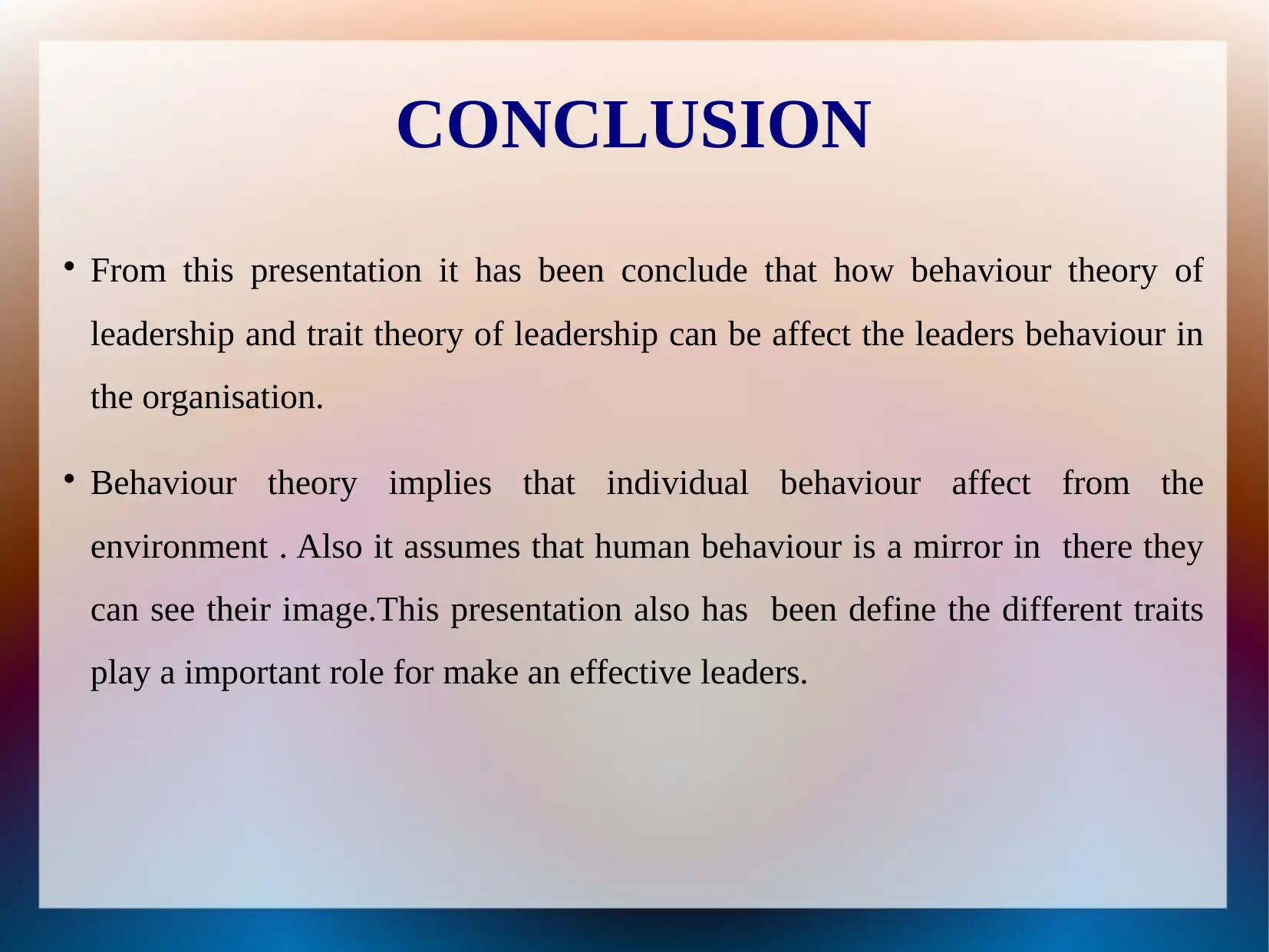
CONCLUSION
From this presentation it has been conclude that how behaviour theory of
leadership and trait theory of leadership can be affect the leaders behaviour in
the organisation.
Behaviour theory implies that individual behaviour affect from the
environment . Also it assumes that human behaviour is a mirror in there they
can see their image.This presentation also has been define the different traits
play a important role for make an effective leaders.
From this presentation it has been conclude that how behaviour theory of
leadership and trait theory of leadership can be affect the leaders behaviour in
the organisation.
Behaviour theory implies that individual behaviour affect from the
environment . Also it assumes that human behaviour is a mirror in there they
can see their image.This presentation also has been define the different traits
play a important role for make an effective leaders.
Paraphrase This Document
Need a fresh take? Get an instant paraphrase of this document with our AI Paraphraser
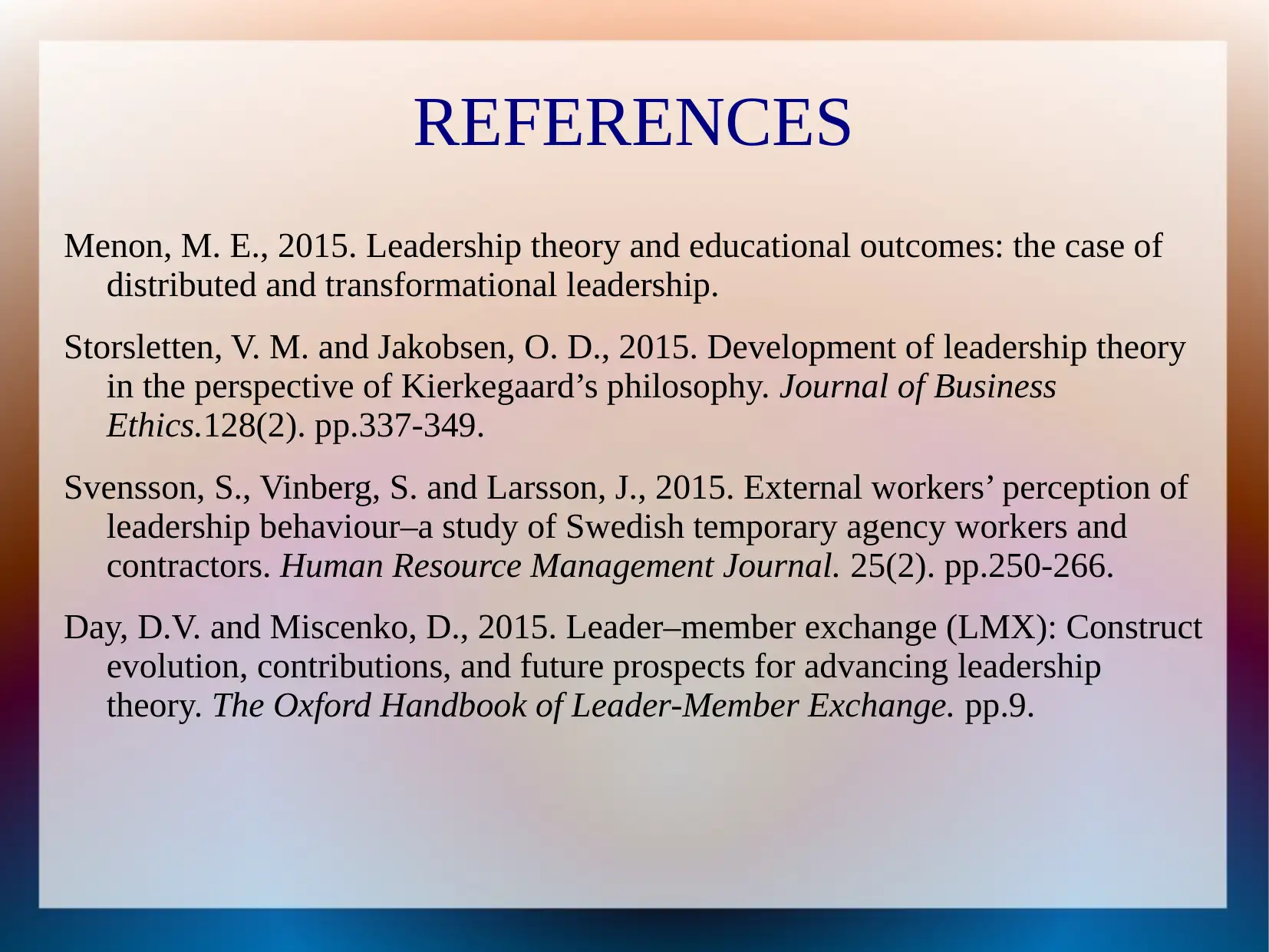
REFERENCES
Menon, M. E., 2015. Leadership theory and educational outcomes: the case of
distributed and transformational leadership.
Storsletten, V. M. and Jakobsen, O. D., 2015. Development of leadership theory
in the perspective of Kierkegaard’s philosophy. Journal of Business
Ethics.128(2). pp.337-349.
Svensson, S., Vinberg, S. and Larsson, J., 2015. External workers’ perception of
leadership behaviour–a study of Swedish temporary agency workers and
contractors. Human Resource Management Journal. 25(2). pp.250-266.
Day, D.V. and Miscenko, D., 2015. Leader–member exchange (LMX): Construct
evolution, contributions, and future prospects for advancing leadership
theory. The Oxford Handbook of Leader-Member Exchange. pp.9.
Menon, M. E., 2015. Leadership theory and educational outcomes: the case of
distributed and transformational leadership.
Storsletten, V. M. and Jakobsen, O. D., 2015. Development of leadership theory
in the perspective of Kierkegaard’s philosophy. Journal of Business
Ethics.128(2). pp.337-349.
Svensson, S., Vinberg, S. and Larsson, J., 2015. External workers’ perception of
leadership behaviour–a study of Swedish temporary agency workers and
contractors. Human Resource Management Journal. 25(2). pp.250-266.
Day, D.V. and Miscenko, D., 2015. Leader–member exchange (LMX): Construct
evolution, contributions, and future prospects for advancing leadership
theory. The Oxford Handbook of Leader-Member Exchange. pp.9.
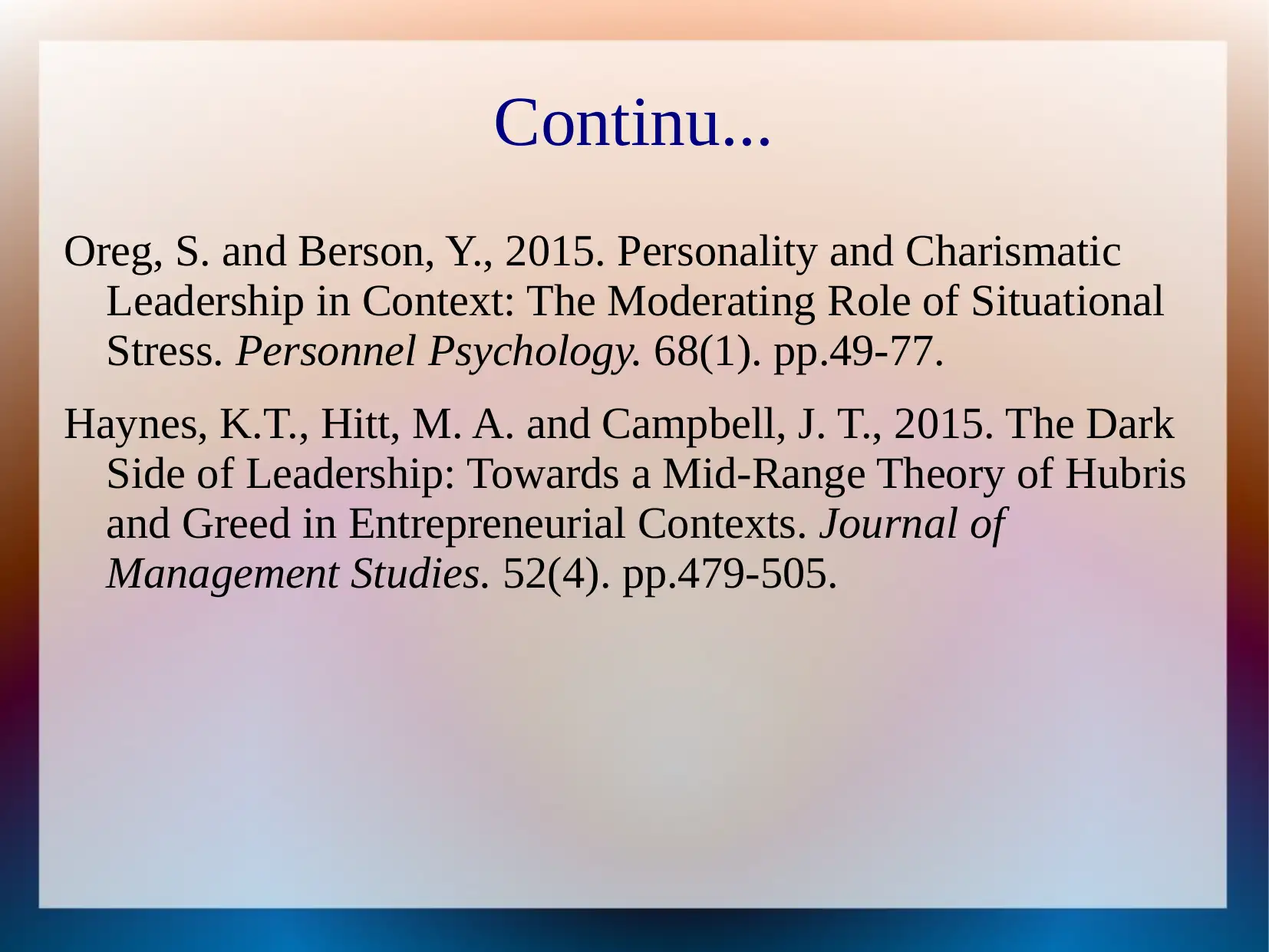
Continu...
Oreg, S. and Berson, Y., 2015. Personality and Charismatic
Leadership in Context: The Moderating Role of Situational
Stress. Personnel Psychology. 68(1). pp.49-77.
Haynes, K.T., Hitt, M. A. and Campbell, J. T., 2015. The Dark
Side of Leadership: Towards a Mid‐Range Theory of Hubris
and Greed in Entrepreneurial Contexts. Journal of
Management Studies. 52(4). pp.479-505.
Oreg, S. and Berson, Y., 2015. Personality and Charismatic
Leadership in Context: The Moderating Role of Situational
Stress. Personnel Psychology. 68(1). pp.49-77.
Haynes, K.T., Hitt, M. A. and Campbell, J. T., 2015. The Dark
Side of Leadership: Towards a Mid‐Range Theory of Hubris
and Greed in Entrepreneurial Contexts. Journal of
Management Studies. 52(4). pp.479-505.
⊘ This is a preview!⊘
Do you want full access?
Subscribe today to unlock all pages.

Trusted by 1+ million students worldwide
1 out of 13
Related Documents
Your All-in-One AI-Powered Toolkit for Academic Success.
+13062052269
info@desklib.com
Available 24*7 on WhatsApp / Email
![[object Object]](/_next/static/media/star-bottom.7253800d.svg)
Unlock your academic potential
Copyright © 2020–2026 A2Z Services. All Rights Reserved. Developed and managed by ZUCOL.





